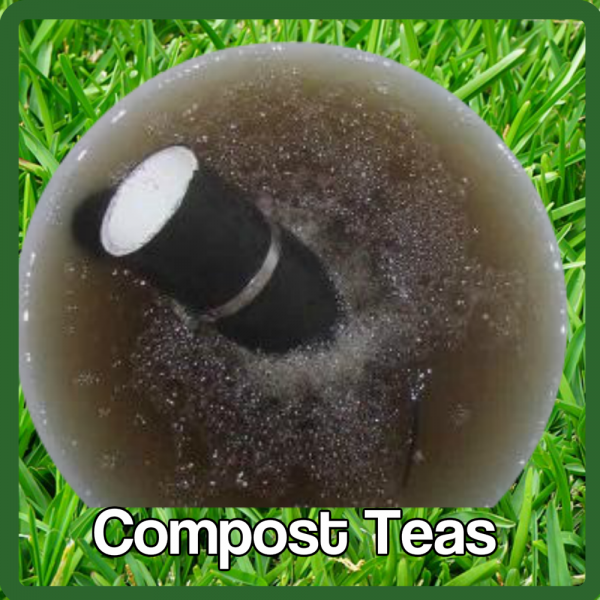Compost Tea is a home made spray that is applied to fine turf to increase the micro life in the soil.
We know that healthy turf is an essential element of a performance bowling green. We know that in order to maintain turf health we must have healthy, vibrant soil. As a regular visitor to bowls central you know that I’ve (almost) exhaustively ranted on about soil microbes and how important they for the health of the soil and turf.
The fact is that many of our greens are maintained in an unsustainable manner, both agronomically and economically. Over the last 4 decades, greenkeeping has slipped into a negative space with practices that focus only on symptoms management. The over reliance on inorganic fertilisers and pesticides and the obsession with sand top-dressing has reduced many greens to unpredictable, annual meadow grass dominated swards that are difficult to maintain for performance, which of course is what our members want from the green.
On such greens, much of the greenkeeper’s time is spent fire-fighting; watching for disease outbreaks and spraying them, adding ever increasing amounts of inorganic fertiliser to try to produce a surface for big games, top-dressing to try to overcome the surface anomalies that are constantly changing and moving due to excessive thatch.
Now, with the available pesticides being diminished rapidly and with many legal restrictions on who can use them anyway we are fast approaching a time when bowling clubs and golf clubs can no longer afford to continue on this road. A road that, incidentally, forces greenkeepers to constantly fight against nature instead of working with it. But there is an alternative future that is much brighter. Natural greenkeeping methods are becoming very popular again at last. My book Performance Bowling Greens, which promotes this kind of approach to green maintenance has increased in popularity every year since it was first published in 2010.
One management practice that I didn’t cover in any detail in the book (but which will definitely be featured heavily in the next edition) is the use of Compost Tea as a key part of any greenkeeping program where the soil and turf has been compromised by years of inorganic fertiliser and pesticide use.
What is Compost Tea?
Tea is a bit of a misnomer to start with as what we are making is more akin to a soup. Instead of carrots, leeks and lentils though, this particular soup’s main ingredients are a mass of microorganisms (microbes) which are naturally found in a healthy soil. The term “soil microbes” is a catch all description for a variety of different microorganisms which, in naturally occurring healthy soils include many billions of bacteria, billions of fungi, millions of protozoa and nematodes, all of which have their own roles in the bowling green ecosystem.
The word tea here is used more to illustrate how the brew is made. It’s very much like making tea. We use a brewer (teapot) and the initial microbe population of the final brew are contained within a compost mix, in what is essentially a big teabag. During the compost tea brewing process these aerobic microbes are encouraged out of the compost teabag into the water in the brewer.
Now, given the right conditions these soil microbes replicate and grow in number very rapidly and this is the reason for the tea brewing process, to make a spray solution that is abundant in beneficial soil microbes. To encourage this rapid upscaling in the microbe population we add a food source for them to the tea brewer. This can be formulated to encourage a bacteria dominated tea for annuals such as Annual Meadow Grass (Poa annua), or a fungi dominated tea for perennials like bentgrasses (Agrostis) and fescues (Festuca). More on the reasons for that in a later article.
In the case of compost tea, brewing describes the constant oxygenation and agitation of the tea mix by means of a special pump. The added oxygen and food source ensures that the microbe population explodes and multiplies many times over. When the brew is ready it is filtered into the sprayer, diluted and then applied to the turf directly.
On greens that have been managed in the conventional way for any length of time i.e. using pesticides and inorganic fertilisers, it’s likely that the soil microbe population will be significantly depleted. There might also be gaps in the eco-system, essentially “missing microbes”. Compost Tea provides a fresh population of the full range of microbes to bolster existing populations and even re-establish missing ones. Through repeated applications of your Compost Tea these new microbes will establish and replicate. The benefits of this full and abundant population of soil microbes will be manifold as their specific enzymes and toxins act in the soil encourage plant health for the very species you want to promote. Even in relatively healthy greens, where thatch is under control and a more natural greenkeeping program is already used, Compost Tea provides a wonderful probiotic boost, maintaining microbe diversity and helping to compensate for microbes lost through predation (it’s a jungle under your feet!).
By maintaining a diverse population of soil microbes you can make sure that the soil eco-system remains in balance and that no single organism dominates or is allowed to grow uninhibited. Think about that for a moment. The soil most likely to encourage the perennial grasses we are trying to encourage is one where there is a strong population of the full diversity of soil fungi. If one of these fungi, let’s say fusarium, becomes dominant then we get disease outbreaks if all of the other conditions are right for that. So by spraying fungicides (which kill all fungi, good and bad) regularly, we are almost guaranteeing that we will have a sward dominated by soft, shallow rooting, seed-head producing annual meadow grass!
But why do we need Microbes?
Like I said earlier, the soil is like a jungle with many billions of organisms shouldering their way through the crowd to claim there spot in the eco-system. It’s very uncivilised down there, almost anarchic and certainly has a dog eat dog quality to it. We humans definitely have the best role in this particular eco-system, gently rolling up the odd wood and sipping real ale in the sun.
Meantime our essential microbes are engaged in all out warfare. producing chemical toxins with which to stop and kill each other. This keeps the overall population in the right order. Left to their own devices this activity ensures that no single species can dominate and become a problem to our grass plants or the other microorganisms. Some microbes are predators and some are prey and this also has the effect of keeping things in balance.
Squabbling aside, these microbes all have important day jobs. They produce a mind-boggling array of enzymes which breakdown organic material like thatch, making the soil crumbly and providing it with structure. This recycling of organic material, helpfully results in the microbes excreting by-products of their activity like Nitrogen in the form of Ammonium, useful!
The soil Nitrogen cycle is carried out primarily by specialised Bacteria in the soil. During this miraculous process, Nitrogen in the form of Ammonium and Nitrate are fairly useful by-products. Other specialised microbes in make Sulphur soluble, producing sulphates and turning locked up phosphorous into phosphates, all of which makes these essential plant building block elements available to the grass plants.
Finally for now microbes play a role in priming the plants’ immune system, meaning that they have a wide ranging effect on plant health generally from basic protection through nutrition and assisting in preparedness for attacks by pathogenic organisms such as fungal diseases.
I think all of this makes the case pretty strongly for adopting Compost Tea brewing as part of your natural greenkeeping program.
Getting Started with Compost Tea
So what do you need to get started on your own Compost Tea Program for your green?
First thing to say is that time is of the essence with compost tea so it’s essential that you brew your own onsite, so that you can get it on the turf asap. This way you also control the quality; you know exactly what’s gone into your own home brew!
You’ll need a few pieces of equipment and a supply of quality assured tea ingredients as follows:
Your own compost tea brewer
A self contained unit that holds the brew and and a pump that oxygenates it during production. A 25 litre brewer is inexpensive and easily makes enough compost tea to treat a bowling green.
Tea bag
Yes, believe it or not you’ll need a teabag which you can use to hold your microbe rich compost during the brewing process.
Compost and Nutrients
Specially formulated compost, with high populations of natural soil fungi and essential bacteria plus protozoa and beneficial nematodes. This includes a comprehensive nutrient pack containing the nutrients required for bacterial and fungal growth plus key nutrients and minerals to provide support for the growing micro-organisms in your compost tea brew.
Fungal Additives
Many lignase producing fungi that degrade thatch do not grow in the time it takes to make a good compost tea. This highly concentrated mix of 7 species of soil fungi is selected for its ability to degrade thatch and organic matter converting it to humus and essential organic acids. The fungi also maintain the fungal dominance needed for perennial grass growth and to help out compete the fungi that cause fairy rings and fungal dry patch. Simply add 100-500 gms per hectare to your compost tea at the beginning of the brewing cycle.
Filter
You’ll need a good filter to make sure you don’t clog up your sprayer with solids.
Special Offer from Bowls Central
I’ve worked with one of the leaders in Compost Tea brewing science to come up with a starter pack especially designed for bowling clubs.
The starter pack contains everything you need to make several brews including a 25 litre tea brewer, a high quality compost and nutrients pack, a compost tea bag, filter and specially formulated fungal additives.

